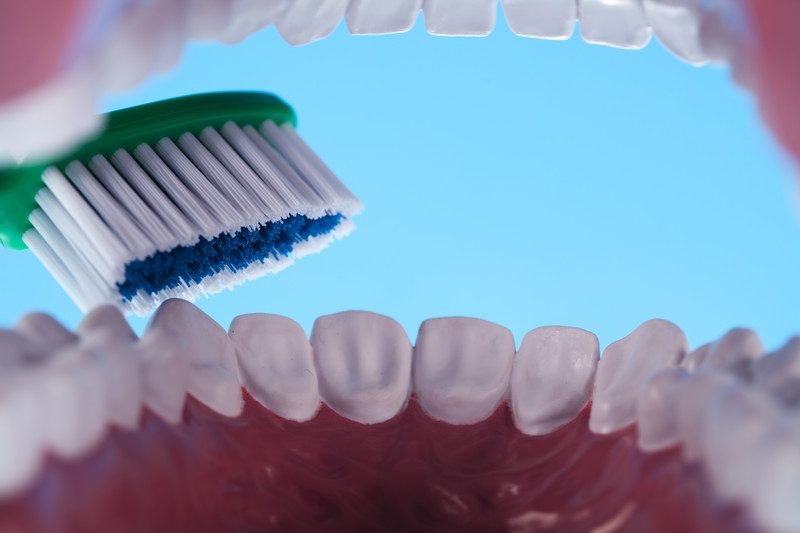Questions For The Dentist: I Have Bleeding Gums – What Does This Mean?

It’s happened to many of us: You brush and floss your teeth and notice blood. It can be shocking, but it doesn’t necessarily mean there is a large problem. There are several reasons why you may have bleeding gums; sometimes they bleed when you brush or floss, and other times, there’s no direct event – your gums just bleed.
Some of the reasons may be a temporary condition, but certainly other reasons are more concerning. Bleeding gums are a reason to go see your family dentist, or maybe even a local emergency dentist. If you are concerned about any aspect of your oral health, you should see your dentist for a professional diagnosis, and this oral issue is no exception.
Here are the most common causes of bleeding gums:
GINGIVITIS
The first stage of gum disease is gingivitis. This condition is caused by a buildup of plaque on your teeth at the gum line; it starts as a low-grade, chronic infection that suffocates and damages the gums, causing them to recede and pull away from your teeth. Gingivitis causes swollen gums, which can sometimes bleed when you brush. Gingivitis responds well to consistent flossing and effective brushing habits. Regular dental cleanings and checkups help, too!
BLOOD THINNING MEDICATIONS
Blood thinning medications will decrease your blood’s clotting ability, and this can lead to bleeding when brushing your teeth, especially so when don’t you use a soft toothbrush. Make sure your dentist is aware of the medications you are taking.
CHANGING YOUR FLOSSING PRACTICE
Bleeding gums can occur when you have resumed flossing after having stopped. Flossing doesn’t just clean between your teeth; it also stimulates your gums. When you’ve been lax on your dental care and haven’t flossed, your gums become softer and more sensitive. This bleeding should stop within several days, once your gums get used to it again.
However, you may want to review your flossing practice with your dentist. If you’re flossing too harshly, you might damage your gums. If you’re concerned, it never hurts to get a cleaning and exam at your local family dentist – they can tell you exactly what’s going on and how to fix it.
USING A NEW TOOTHBRUSH
If you have switched from a soft toothbrush to a firm toothbrush, then this could cause your gums to bleed. Your dentist can advise you about the right toothbrush for you. Sometimes, we can go a little overboard on our at-home oral care by over-brushing or brushing too hard. This is the oral health version of “too much of a good thing”; it can damage your gums and make them recede.
POORLY-FITTING DENTAL INSTALLATIONS
Often, if you’ve had teeth extracted and replaced, you’re dealing with an oral appliance like bridges, implant crowns or dentures, your jaw might change over time, making it so the appliance doesn’t fit right anymore. This can cause pressure and rubbing on the gums, which can result in toothaches and bleeding gums.
YOUR DIET
A diet rich in fruit and vegetables combined with nutritional supplements and anti-inflammatories like fish oil are essential for enabling the development and maintenance of good oral health. A good diet supports the oral soft tissues as well as the bone health of your face and jaw.
Poor diets heavy in sugars, sticky foods, and acids from sodas and fruit juice are dangerous for your gums and teeth. They can cause plaque, cavities and compromised enamel, which can end up in a broken tooth extraction, or worse, having ruined gum tissue removed and replaced with a soft tissue graft.
SERIOUS ILLNESSES
Some medical conditions can cause bleeding gums. One such malady is leukemia, a blood cancer. Other examples include diabetes, scurvy and hemophilia. Often, these are symptoms of the medical condition itself and not a sign that you have gum infection or disease.
However, when your health is compromised, your oral health is always at risk; so, even if you seem to spend too much time in medical offices, you really should keep in touch with your dentist during the course of your illness in order to be as comfortable and safe as possible. Good dental care is good self-care.
GINGIVITIS & LOOSE TEETH DURING PREGNANCY
Pregnancy changes your body – often, women experience issues with bone density as well as movement. This might cause teeth to ache or feel loose. Once you know you’re pregnant, you should schedule an appointment with a dentist close to home right away. They can safely take x-rays of your mouth, do a thorough dental cleaning, and perform an exam so they can properly advise you on how to protect your teeth and gums during pregnancy.
Pregnant women may also experience swollen gums that bleed after brushing. While this condition usually clears up after pregnancy, it is a good idea to discuss the matter with your dentist. The problem may be more serious than it appears to be, and the dentist can determine if treatment is needed.
Check with Your Cincinnati Family Dentist
When the bleeding worsens and becomes more of a concern, then it’s time to see the dentist. Don’t take a chance on the problem growing into something more serious. If you are having issues with your gums bleeding and you are in need of top Cincinnati-area dentists known for their skilled and gentle dental care, don’t hesitate to contact Beckham Square Family Dental near Sharonville and Blue Ash to set up an appointment.
REFERENCES
Prevention: 9 Weird Reasons Your Gums are Bleeding
